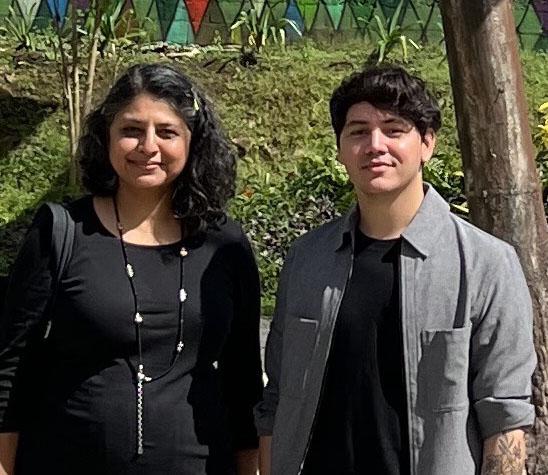
Professors Bagchee and Cruz visit 'solar trees' at Casa Pueblo, Adjuntas, Puerto Rico doing research on their Buell Center and ACSA award-winning proposed course on climate change.
City College of New York’s Bernard and Anne Spitzer School of Architecture Adjunct Lecturer Pedro Cruz Cruz and Associate Professor Nandini Bagchee have won a course development prize from Columbia University’s Temple Hoyne Buell Center for the Study of American Architecture and the Association of Collegiate Schools of Architecture (ACSA). The course titled Archipelagic Estates of Puerto Rico: Islands and Island Cultures in light of Climate Change was one of five winners of the 2023 Course Development Prize in Architecture, Climate Change, and Society. Winners receive cash and support to implement their courses at their ACSA-member school within the next two years, and their course proposals will be presented at the ACSA 111th Annual Meeting.
The idea for the course was conceived one month after the 2022 hurricane Fiona inundated the island's coastal communities, and five years after Cruz departed Puerto Rico in the wake of the devastation of hurricanes Irma and Maria. For Cruz and students at The City College from the diaspora, the course provides an opportunity to come full circle and think about the future of the Caribbean. The course will research the long-term effects of hurricanes and sea level rise to the southern coastal communities of Puerto Rico and look for viable models of habitation while building on the traditional cultures of self-reliance.
The south, once the center of agro-industrial production, is now the locus of polluting coal and gas power plants. The deteriorating infrastructures of consumption and production will have to be removed or remade in a post-carbon era of an ecologically sustainable urbanism.
The ongoing colonial status of Puerto Rico and lack of democratic representation has generated a resilient culture of self-organization and survival through mutual aid in the marginalized communities of southern Puerto Rico. Disruption will be seen positively in this curriculum as a tactic to combat the lack of support from local officials and federal policy.
“I see this as a great opportunity to investigate new pedagogies of teaching about the big environmental challenges confronting our discipline by combining local knowledge with design,” said Bagchee.
Critical tools of architectural drawing and modelling will be used while engaging in a dialog with an interdisciplinary cohort of anthropologists, environmental scientists, and spatial practitioners. Drawing from a network of local and diasporic coalitions, research will build upon the work of grassroots organizers and institutions connected to the southern geography.
“Part of what makes the course meaningful is the cross-Atlantic dialog between faculty and students at the Spitzer School of Architecture and a host of community organizers and educational institutions in Puerto Rico,” said Cruz, who is a 2022 MArch graduate of the Spitzer School.
About the City College of New York
Since 1847, The City College of New York has provided a high-quality and affordable education to generations of New Yorkers in a wide variety of disciplines. CCNY embraces its position at the forefront of social change. It is ranked #1 by the Harvard-based Opportunity Insights out of 369 selective public colleges in the United States on the overall mobility index. This measure reflects both access and outcomes, representing the likelihood that a student at CCNY can move up two or more income quintiles. Education research organization Degree Choices ranks CCNY #1 nationally among universities for economic return on investment. In addition, the Center for World University Rankings places CCNY in the top 1.8% of universities worldwide in terms of academic excellence. Labor analytics firm Emsi puts at $1.9 billion CCNY’s annual economic impact on the regional economy (5 boroughs and 5 adjacent counties) and quantifies the “for dollar” return on investment to students, taxpayers and society. At City College, more than 15,000 students pursue undergraduate and graduate degrees in eight schools and divisions, driven by significant funded research, creativity and scholarship. This year, CCNY launched its most expansive fundraising campaign, ever. The campaign, titled “Doing Remarkable Things Together” seeks to bring the College’s Foundation to more than $1 billion in total assets in support of the College mission. CCNY is as diverse, dynamic and visionary as New York City itself. View CCNY Media Kit.